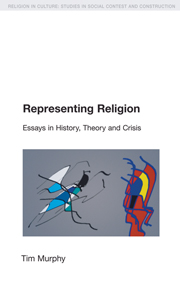Book contents
- Frontmatter
- Dedication
- Contents
- Acknowledgements
- Chapter 1 The “Crisis of Representation” and the Academic Study of Religion
- Part I Phenomenology, Consciousness, Essence: Critical Surveys of the History of the Study of Religion
- Chapter 2 “Individual Men in their Solitude”: A Critique of William James' Individualistic Approach to Religion in The Varieties of Religious Experience
- Chapter 3 The Concept of “Essence-and-Manifestation” in the History of the Study of Religion
- Chapter 4 The Concept of “Development” in Continental Geisteswissenschaft and Religionswissenschaft: Before and After Darwin
- Chapter 5 The “Transcendental Pretense” and Eliade's Humanist Hermeneutics
- Part II Towards a Nietzschean Semiotics of Religion
- Notes
- Bibliography
- Index of Subjects
- Index of Names
Chapter 2 - “Individual Men in their Solitude”: A Critique of William James' Individualistic Approach to Religion in The Varieties of Religious Experience
from Part I - Phenomenology, Consciousness, Essence: Critical Surveys of the History of the Study of Religion
- Frontmatter
- Dedication
- Contents
- Acknowledgements
- Chapter 1 The “Crisis of Representation” and the Academic Study of Religion
- Part I Phenomenology, Consciousness, Essence: Critical Surveys of the History of the Study of Religion
- Chapter 2 “Individual Men in their Solitude”: A Critique of William James' Individualistic Approach to Religion in The Varieties of Religious Experience
- Chapter 3 The Concept of “Essence-and-Manifestation” in the History of the Study of Religion
- Chapter 4 The Concept of “Development” in Continental Geisteswissenschaft and Religionswissenschaft: Before and After Darwin
- Chapter 5 The “Transcendental Pretense” and Eliade's Humanist Hermeneutics
- Part II Towards a Nietzschean Semiotics of Religion
- Notes
- Bibliography
- Index of Subjects
- Index of Names
Summary
What are the necessary presuppositions underlying a psychology of religion? The answer one gives to this question is crucial to any attempt to theorize religion for it will delineate in a decisive way what the object, or possible objects, of such a logos would or can be. The presuppositions of a psychology of religion necessarily delineate both psyche and “religion” as possible objects of a logos, a discourse, and as objects having a definite relation to one another. To deny those presuppositions is to change the very objects, “self/psyche,” and “religion,” and their accessibility to, or position within, a given logos.
One of the classical sites for the articulation of a psychology of religion is William James’ The Varieties of Religious Experience. The book has long enjoyed canonical status within the field of Religious Studies and is often cited as an authoritative statement on both the nature of religion and of religious experience. As James Luther Adams has noted, “the Varieties has been and still is rightly considered as a classic, indeed to be a work of genius. Probably it has been more widely read, and in college courses more widely recommended, than any other modern book on religion” (Adams 1991, 91). Moreover, it contributed to the establishment of a new and distinct paradigm in Religious Studies, a paradigm based upon the primacy of interior experience.
- Type
- Chapter
- Information
- Representing ReligionEssays in History, Theory and Crisis, pp. 38 - 53Publisher: Acumen PublishingPrint publication year: 2007

